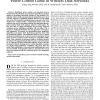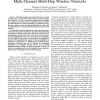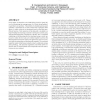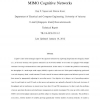37 search results - page 7 / 8 » CDMA Uplink Power Control as a Noncooperative Game |
COMCOM
2008
13 years 7 months ago
2008
Code allocation has a significant impact on the performance of Code Division Multiple Access (CDMA) systems. For the uplink direction, in 3G Wideband CDMA (WCDMA) cellular systems...
TON
2008
13 years 7 months ago
2008
Distributed power control is an important issue in wireless networks. Recently, noncooperative game theory has been applied to investigate interesting solutions to this problem. Th...
ICC
2009
IEEE
13 years 5 months ago
2009
IEEE
Typically, topology control is perceived as a per-node transmit power control process that achieves certain networklevel objectives. We take an alternative approach of controlling ...
CODES
2003
IEEE
14 years 20 days ago
2003
IEEE
In this paper, we describe a new methodology based on game theory for minimizing the average power of a circuit during scheduling in behavioral synthesis. The problem of schedulin...
INFOCOM
2012
IEEE
11 years 9 months ago
2012
IEEE
Cognitive radio (CR) techniques improve the spectrum utilization by exploiting temporarily-free frequency bands (i.e., in the time domain). The spectrum utilization can be boosted...




